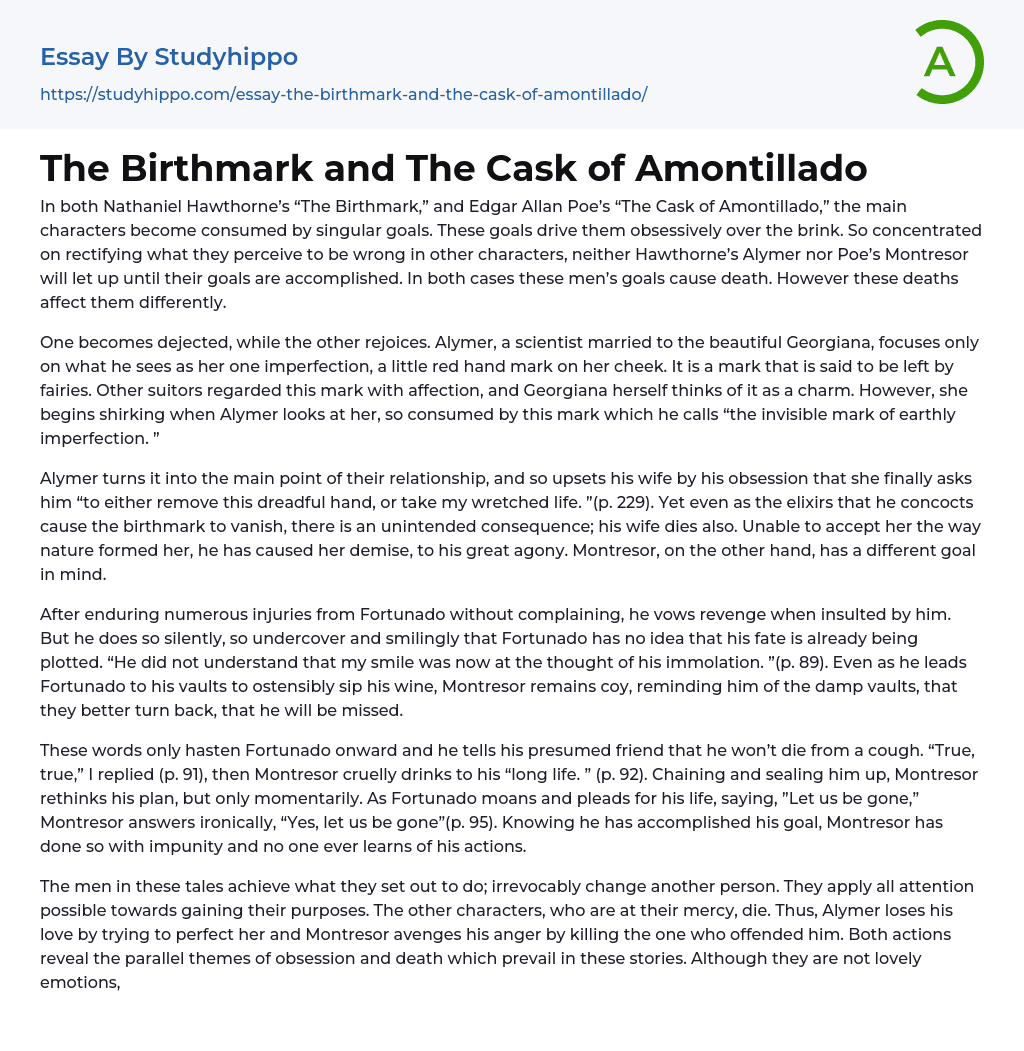In both Nathaniel Hawthorne’s “The Birthmark,” and Edgar Allan Poe’s “The Cask of Amontillado,” the main characters become consumed by singular goals. These goals drive them obsessively over the brink. So concentrated on rectifying what they perceive to be wrong in other characters, neither Hawthorne’s Alymer nor Poe’s Montresor will let up until their goals are accomplished. In both cases these men’s goals cause death. However these deaths affect them differently.
One becomes dejected, while the other rejoices. Alymer, a scientist married to the beautiful Georgiana, focuses only on what he sees as her one imperfection, a little red hand mark on her cheek. It is a mark that is said to be left by fairies. Other suitors regarded this mark with affection, and Georgiana herself thinks of it as a
...charm. However, she begins shirking when Alymer looks at her, so consumed by this mark which he calls “the invisible mark of earthly imperfection. ”
Alymer turns it into the main point of their relationship, and so upsets his wife by his obsession that she finally asks him “to either remove this dreadful hand, or take my wretched life. ”(p. 229). Yet even as the elixirs that he concocts cause the birthmark to vanish, there is an unintended consequence; his wife dies also. Unable to accept her the way nature formed her, he has caused her demise, to his great agony. Montresor, on the other hand, has a different goal in mind.
After enduring numerous injuries from Fortunado without complaining, he vows revenge when insulted by him. But he does so silently, so undercover and smilingly that Fortunado ha
no idea that his fate is already being plotted. “He did not understand that my smile was now at the thought of his immolation. ”(p. 89). Even as he leads Fortunado to his vaults to ostensibly sip his wine, Montresor remains coy, reminding him of the damp vaults, that they better turn back, that he will be missed.
These words only hasten Fortunado onward and he tells his presumed friend that he won’t die from a cough. “True, true,” I replied (p. 91), then Montresor cruelly drinks to his “long life. ” (p. 92). Chaining and sealing him up, Montresor rethinks his plan, but only momentarily. As Fortunado moans and pleads for his life, saying, ”Let us be gone,” Montresor answers ironically, “Yes, let us be gone”(p. 95). Knowing he has accomplished his goal, Montresor has done so with impunity and no one ever learns of his actions.
The men in these tales achieve what they set out to do; irrevocably change another person. They apply all attention possible towards gaining their purposes. The other characters, who are at their mercy, die. Thus, Alymer loses his love by trying to perfect her and Montresor avenges his anger by killing the one who offended him. Both actions reveal the parallel themes of obsession and death which prevail in these stories. Although they are not lovely emotions, they are vivid ones and accurately reflect what is inside Alymer and Montresor.
- 1984 essays
- A Farewell to Arms essays
- A Good Man Is Hard to Find essays
- A Hanging essays
- A Lesson Before Dying essays
- A Long Way Gone essays
- A Rose For Emily essays
- A Separate Peace essays
- A Tale Of Two Cities essays
- A Very Old Man With Enormous Wings essays
- Adventures Of Huckleberry Finn essays
- Alice in Wonderland essays
- All Quiet on The Western Front essays
- Allegory of the Cave essays
- An occurrence at owl creek bridge essays
- Animal Farm essays
- Anthem essays
- Antigone essays
- Arthur Conan Doyle essays
- As I Lay Dying essays
- Atticus Finch essays
- Barn Burning essays
- Battle Royal essays
- Beauty and The Beast essays
- Beloved essays
- Boo Radley essays
- Brave New World essays
- Candide essays
- Castle essays
- Characters In Hamlet essays
- Characters In Romeo And Juliet essays
- Christmas carol essays
- Chronicle of a Death Foretold essays
- Cinderella essays
- Crime and Punishment essays
- Daisy Miller essays
- Death of a Salesman American Dream essays
- Desdemona essays
- Diary Of A Wimpy Kid essays
- Dracula essays
- Dubliners essays
- Emma essays
- Ender'S Game essays
- Ethan Frome essays
- Eveline essays
- Fahrenheit 451 essays
- First-Person Narrative essays
- Fish Cheeks essays
- Frankenstein essays
- Genesis essays




